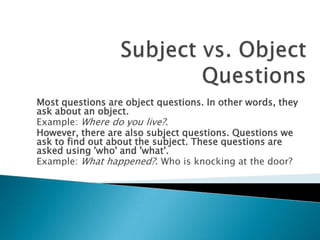Subject vs object questions
•Descargar como PPTX, PDF•
5 recomendaciones•9,386 vistas
The document discusses two types of questions: subject questions and object questions. Subject questions ask about the subject of a sentence and do not change the word order, while object questions ask about the object and require changing the word order. Examples are provided of subject questions using "who" and "what", and object questions where the word order is changed and ends with "who" or "what". The end of the document provides additional examples of subject and object questions.
Denunciar
Compartir
Denunciar
Compartir

Recomendados
Recomendados
Future will, be going to, present continuous and present simple with the idea...

Future will, be going to, present continuous and present simple with the idea...Danitza Lazcano Flores
Más contenido relacionado
La actualidad más candente
Future will, be going to, present continuous and present simple with the idea...

Future will, be going to, present continuous and present simple with the idea...Danitza Lazcano Flores
La actualidad más candente (20)
Future will, be going to, present continuous and present simple with the idea...

Future will, be going to, present continuous and present simple with the idea...
Destacado (20)
Más de Carmen Olmedo Rueda
Más de Carmen Olmedo Rueda (20)
Islcollective worksheets intermediate_b1_upperintermediate_b2_adult_h_nondefi...

Islcollective worksheets intermediate_b1_upperintermediate_b2_adult_h_nondefi...
Islcollective worksheets intermediate_b1_high_school_writing_relativ_relative...

Islcollective worksheets intermediate_b1_high_school_writing_relativ_relative...
Subject vs object questions
- 1. Most questions are object questions. In other words, they ask about an object. Example: Where do you live?. However, there are also subject questions. Questions we ask to find out about the subject. These questions are asked using 'who' and 'what'. Example: What happened?. Who is knocking at the door?
- 2. SUBJECT QUESTION A subject question asks about the subject of the sentence. Do NOT change the word order of the question. ANSWER QUESTION Gina is fixing the computer. Who is fixing the computer? An accident happened last week. What happened last week? OBJECT QUESTION An object question asks about the object of the sentence. You MUST change the word order of the question. ANSWER QUESTION Gina met Mary. Who did Gina meet? Frank saw an accident. What did Frank see?
- 4. Who is working with the nurse?
- 5. Who is the doctor working with?
- 6. What did the repairman work on yesterday?
- 7. Who worked on the computer yesterday?
- 8. What did the woman write?
- 9. Who wrote a long letter?
- 10. Who gave the students some advice?
- 11. What did the teacher give the students?
